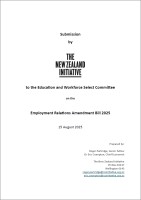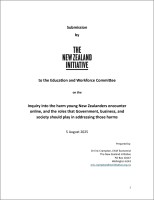Press Statement: Government fast‑tracks supermarket entry in line with NZI blueprint
Wellington (Wednesday, 27 August 2025) – The Government’s supermarket package adopts the right strategy for competition – remove barriers to entry and open the door to investment. That is the core approach The New Zealand Initiative has championed for years, including in a May 2025 research note, A Fast-Track Supermarket Entry and Expansion Omnibus Bill, setting out a rules‑based alternative focused on planning, consenting and overseas investment. Read more









